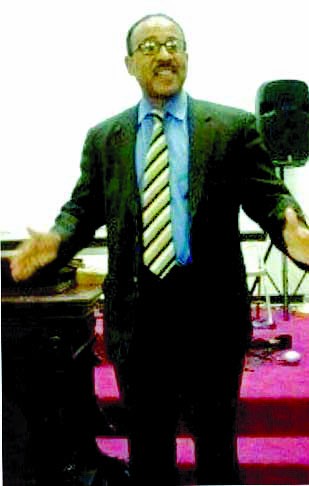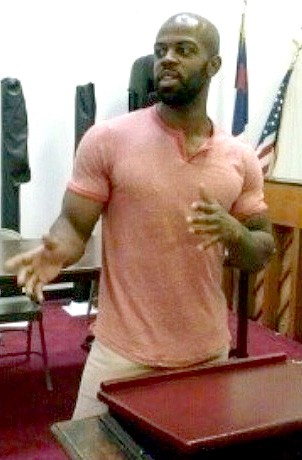Lewis Ford, who recently was released from prison after serving five years, spoke about his time incarcerated during the May 29 meeting. PHOTO COURTESY OF NAFISAH LEWIS
Nafisah Lewis wants kids to know how bad being bad can be. So the Northeast EPIC Stakeholders coordinator arranged for some people to tell them.
A corrections worker, a prosecutor, a former prison lifer, a man recently released from prison and a former juvenile offender told neighborhood kids crowded into the basement of the Second Baptist Church of Frankford how they really don’t know the truth or the consequences of getting into trouble with the law.
It’s going to be summer, Lewis said during the Stakeholders’ May 29 session, and without the structure of school, some kids aren’t going to make it through.
“Some will be behind bars and some will be six feet under,” she said bluntly.
Kids, no matter how tough they think they are, are not prepared for prison, said Michelle Rivera, who has worked in both adult and juvenile jails.
She said she has seen young kids doing time for crimes like murder. “They were babies … They were tough on the streets, and at night they were crying like babies,” she said. “They’re trying to be tough when they’re scared.”
“You are locked in a room with other girls or boys you don’t know,” she said. “You’re told when to get up and when to get in line … You have to share bathrooms … Freedom is completely taken away.”
It’s not a badge of honor to be in jail, she said. “You might not have much, but you do have your freedom. Don’t give it away to anyone.”
Lewis Ford told the kids he knows all too well what it is to be inside looking out. He’s been out of jail for just a few weeks, he said. He had spent the last five years in state prison.
“From 15 to 26, I was on the streets, selling drugs,” he said. And then he went to jail. “I didn’t come home until I was 31 … Think of all the time I wasted.”
What he had valued before, he said, wasn’t worth it.
“The things I glorified before almost destroyed my whole family,” he said. “What I did was harming the whole community.”
Working for a living, even though it’s hard, is being tough, he said, not carrying a gun, selling drugs, destroying the community.
Steve Blackburn told the kids he is the assistant director of community services for Carson Valley Children’s Aid.
“But I’m not speaking to you in that capacity,” he said. “I am a formerly convicted person.”
Blackburn said he was sentenced to life in prison in 1976 for his part in a shooting.
“I was blessed to have my sentence commuted in 1990,” he said softly. “But I want you young folks to hear me: You don’t have to kill anybody to get a life sentence.”
He said he was just with someone who gunned somebody else down. The gunman implicated Blackburn and took a deal. Jurors found Blackburn guilty and then decided if he were to get life in prison or death.
“I know guys who got 40-plus years in prison and they didn’t shoot anybody,” he said.
Blackburn since got advance degrees, he told the students, but he still has to give a urine sample to the parole board to prove he’s drug free.
Everything he’s accomplished since his release doesn’t matter to the parole board. “It don’t mean nothing when it comes to that pee.”
Away for more than a decade and a half, life passes you by; things happen so quickly outside prison, he said. When he got out, he didn’t know what an ATM machine was, he said. He saw a friend get money from a machine and was impressed. “I said, ‘Can I try that?’ ”
But the time lost in the past is nothing compared to what is lost to a prisoner after he or she is released, he said.
It’s against the law to discriminate against someone because of race or ethnicity, Blackburn said, but it is legal to discriminate because of a criminal record.
“The actions you take now will follow you around the rest of your life,” he cautioned.
If you deal with life without getting into trouble, you don’t have to find any of this out, he said, adding people have to be wary of making bad choices.
“There are a lot of traps out here,” Blackburn said.
Lewis’s 22-year-old son, Saleem, had been in juvenile detention and has no intention of ever being locked up again.
“That was it for me,” he said, but added he has friends who saw being locked up as juveniles as a stepping stone in life.
“One second can ruin your life,” he said. “I see people I grew up with who have life sentences … they’re never coming home.”
Deputy District Attorney George Mosee Jr. spoke about the juvenile justice system during a March Stakeholders meeting, Lewis said, but there weren’t many kids at that meeting, so she asked the prosecutor to come back last week.
“If I ever didn’t feel like the main speaker, it’s tonight,” he said.
Mosee said the juvenile justice system is set up to help kids get back on track with their lives if they want to, but it is not a forgiving process for repeat offenders. And if a juvenile 15 or older commits an adult crime, he is going to be tried as an adult. There are more people serving life sentences in Pennsylvania for crimes they committed as minors than anywhere else in the country, he said.
Many juveniles believe they can’t be tried as adults or face adult consequences for murder and other serious crimes. There are degrees of offenses.
• A kid who assaults another and steals his bike might get sentenced to community service or time in a juvenile facility. If he does it a second time and if he’s 15-years-old and adjudicated delinquent, the young criminal goes into the adult justice system.
• If he’s 15 and pulls a gun on somebody during a robbery, for example, he might be looking at five to 10 years in a prison for youthful offenders.
• If he’s 15 and is the lookout for somebody else committing an armed robbery, but he isn’t the person with the gun, he might not get mandatory prison time. The person with the gun is facing trial in the adult system. If the person with the gun is 18, he’s looking at 3.5 to seven years. But he can get up to 47 years, Mosee said.
• If the 15-year-old is an accomplice in a crime in which someone else kills somebody, he’s looking at life in prison, Mosee said.
“You have to learn this today,” Lewis told the kids. “This is your future.”
Northeast EPIC Stakeholders’ next meeting will be at 5:30 p.m. on Thursday, June 26, at the Second Baptist Church of Frankford, Meadow and Mulberry streets. ••

Words of wisdom: Deputy District Attorney George Mosee Jr. is responsible for the prosecution of juvenile offenders in Philadelphia. He explained how juveniles may be prosecuted for adult crimes during a recent EPIC Stakeholders meeting. PHOTO COURTESY OF NAFISAH LEWIS





